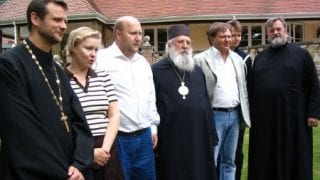Fr. Peter was born in New York in 1964. He grew up in the parish of St. Seraphim of Sarov on Manhattan’s Upper West Side. Fr. Alexander Kisilev, Peter’s grandfather, was the rector of the parish. Peter received his MBA from New York University’s Stern School of Business in 1988. In 1993 he was ordained to the priesthood by Metropolitan Vitaly, who also asked him to assume the position of Treasurer of the Synod of Bishops in New York. Fr. Peter held this position for sixteen years. For many years Fr. Peter has been working in the financial world.
In this interview, Fr. Peter covers such topical issues as the mission of the Russian Church Abroad and the use of funds for its fulfillment. I hope these themes are also being addressed in a conciliar way among the episcopate, clergy, and lay people of our church; the fact that I have not heard of such discussions makes me listen even more intently to the words of Fr. Peter.
What are the similarities and what are incompatibilities in the ecclesiastical and corporate worlds?
I think the biggest, not incompatibilities, but differences are between the missions of the ecclesiastical and secular worlds. The mission of the corporate world is to create financial value, which relates partially to raw human needs (food, water, shelter) and partially to the provision of comfort (luxury real estate, restaurants, development of efficient transportation), whereas the mission of the ecclesiastical world partially relates to assisting with the salvation of souls and partially to serving as a source of comfort for parishoners. In essence the former serves as a materialistic provider; the latter as a spiritual one.
Any organization, whether corporate or ecclesiastical, needs to function in this world and is therefore subject to certain laws and rules, which are universal. God creates rules, under whose auspices every human being functions. When I say “rules” I speak not only about moral rules, but physical ones—rules that govern the worlds of physics and chemistry. By extension, God’s rules extend to, and very much inform, laws. I would say that one similarity between the corporate and ecclesiastical worlds is their mutual attempt to elevate the human experience. Whereas the corporate world serves to increase our living standard by providing both immediate and secondary goods to an ever-wider group of people, the ecclesiastical world plays the role of providing humans with an answer to questions that relate to their heart and soul. However, both corporations and ecclesiastical institutions must operate within boundaries that are subject to universal law and a legal framework. Therefore, similarities between the two are seen in the ways both are structured in the form of a hierarchy and managerial organization.
Continuing in the same vein, I think that in business everything has its price, human life included. Am I missing something? How does entrepreneurial cynicism or pragmatism blend with Christian altruism?

Fr. Peter after presbyter’s ordination by Metropolitan Vitaly. October 1993. St. Sergius cathedral, Cleveland, OH
I do not think that in business human life has a price. I do not think that people in business that have a moral basis are willing to assign a certain price or a certain amount of profit for a human life. I think that governments, which run efficiently, understand that you can count certain things that have a cost associated with them of human lives.
I meant for instance that people that invest in road safety. You can kind of figure out from sort of rewinding back, what the human life costs.
That’s exactly correct. The government does studies and figures out exactly or estimates very efficiently how many dollars it needs to spend to save human lives
I thought that would be the corporate approach, when you do your figures, when you do your math.
It is a corporate approach and of course there is not an infinite amount of dollars the government can spend on road safety. So they make a decision at some point that there is an optimal amount of dollars to be spent on road safety and we have to accept the fact that a certain amount of people are going to die because you cannot set the speed limit to 20 miles an hour and make the country tremendously inefficient. I think there is a parallel to that in the ecclesiastical world, and the parallel to that is that there is a limited amount of resources that can be spent on anything. You could triple the budget on road safety for the government and you would definitely save lives but that doesn’t necessarily mean that’s the best way to spend the money, money that could be spent on healthcare and you would save more lives. So it is a question of efficiency; and I think the church also has a limited amount of resources and a limited amount of assets at its disposal. It is of utmost importance to use those assets to the utmost efficiency. I also think it is tremendously sinful not to do so.
You mentioned in our last conversation about responsibility for the funds that God provided for church. It was quite impressive.
I think you could do an analysis on how much money you spend efficiently to bring one person to church, and there is probably a dollar value you could assign to that. And maybe it is a bit of a cynical approach but it is true, because we do live in this world and if you advertise (and we do advertise) and you do that efficiently and we spend those dollars efficiently, you will definitely maximize the amount of people you bring into church. Out of every single person that comes into church there will be a person who will be touched by the service and will turn his or her heart to God and will find some comfort. So I think absolutely the dollars that God sends us and we throw them out and use them inefficiently, we do that to our spiritual peril.
I think I can relate to this because I do history, and in history you work with verifiable data. If it’s not verifiable it’s not history. It might be very important, very reverent, but it’s not history. I think that your business experience might help you look realistically at our Russian Church Abroad as a human organization. From here, I’d like you to evaluate the path of the Russian Church Abroad from the 1970’s to the present. I realize it’s a huge task. Does this make sense?
Well, I think, I can speak in general terms. I think that any organization needs to set for itself strategic goals. I think that is true for secular organizations, and I think it is true for ecclesiastical organizations. Because if you do not set for yourself strategic goals you will by definition never reach them. If you do set strategic goals, and ambitious strategic goals, and you communicate this to the people who effectively manage the church or run the church then people will understand what it is they are trying to achieve specifically and strategically, what is their mission, how does one in the most efficient manner bring the most people to salvation; again, maximize those assets, to maximize the value that the church brings.
I think that historically, perhaps because of the history of the Church Abroad, which is an emigre church that focused mostly on survival. I remember the stories that my grandfather told when he came to the United States and how he organized a parish [in imigration] and how he organized a summer camp that lasted nine weeks because parents did not have anywhere to send children, people did not have the luxury to think strategically, they thought about survival.
But I think today, especially since the unification with the Russian Orthodox Church we have this new luxury where we can take a step back, and see what specific mission we want to fulfill. What is the most efficient manner in which we can fulfill this mission? And I think once those questions are answered, by definition the church will be able to operate more efficiently.
Personally, I remember ourselves twenty years ago. We look differently. I was an editor of Pravoslavnaya Rus’, supporting our parishes in Russia. So that is part of who I am, who I was. Can you also touch on this issue of your personal evolution, if I may say that?
I think that when I was born in 1964 at the height of the cold war, the whole mission of our church, at that point was focused on preserving Russian Orthodoxy, and speaking out about some of the injustices that were being wreaked upon the Church by the Soviet government. And I think when the Soviet Union fell there was a lot of inertia in that mission, I think that through the efforts of some very spiritual and very intelligent people that inertia was stopped, and people saw the benefit of being united. However, I think that has taken a major strategic goal out of the arsenal of the Church, and the question is what do you replace that with?
It’s great. You’re right on our next question about the mission or, as you put it, the strategic plan of the Russian Church Abroad.
Well for me, it is no secret that I have a background in business, so my approach is when you look at an organization, you ask yourself how do you make it run in the most efficient manner? And I understand that sometimes the Church is the Church and it is more difficult to implement certain efficiencies. But certain things, which I see, are very difficult to comprehend. As for instance why no one looks at demographics. It is very difficult for me to comprehend why we have small towns in the United States with three Russian speaking parishes. By definition, incredibly inefficient. It means that four small parishes, four priests that barely have enough money to survive. No church school, no church hall. You combine those four parishes and all of a sudden you have a big parish with maybe two or three priests that are well taken care of, that do not have to work, with a church school or hall and one thing grows on the other and you use some of the resources that are being piled on those four parishes and you open a parish where there are a lot of new Russians and they is not a church, so you allocate your assets based on demographics. And I think some of that happens naturally, but there is a strategic view. No one has done a demographic study. Where do we need to position our сhurches to captivate the most people?
A second thing that I think is a huge inefficiency — and I know it is a very difficult and complex question, because it touches on jurisdictional matters, and it touches on the canons. But if you look from an efficiency point of view you have three organizations with Russian roots and a Russian history, that are effectively trying to fulfill the same mission in the same territory. And that by definition cannot be efficient. And that is not counting the churches of the Moscow Patriarchate. So there are four organizations now on the same territory trying to fulfill the same mission. I do not know if there is a magical formula to make everybody work together, but I have not heard anybody make an argument that having four organizations trying to do exactly the same thing is the most efficient way. To me, if there is some way, that people can find a way, putting canons aside for a second…
Actually, it would go accordingly with the canons.
I’m not a canonist, so I cannot discuss that, but I do know that there are four organizations trying to do the same thing on the same territory. That is horribly inefficient. And if those four organizations worked as one, under any auspices, call it whatever you want, but remained as one, it would be one more powerful organization, it would be a much better funded organization and I guarantee you the efficiency of the organization the amount of people that it provides comfort to, that it helps, that it brings to the church would at least double.
 I can see that you’re very inspired by our reconciliation with Moscow, but I don’t know if there are similar grounds with the other Churches of the Russian tradition.
I can see that you’re very inspired by our reconciliation with Moscow, but I don’t know if there are similar grounds with the other Churches of the Russian tradition.
Well, I am not advocating any sort of union; but when I became the treasurer, the biggest amount effort went to fighting the Moscow Patriarchate. In courts we did battle with the OCA, we accepted parishes, we lost parishes, we lost lawsuits, properties in the Holy Land, we worked with the politicians. The Russians did the same thing. It was a tremendous amount of effort. And after the union, all of that went away. In one sense, we lost that strategic mission. In another sense all of these resources were freed to do what the Church was supposed to do, which was not to fight over assets and lawsuits. It is supposed to provide comfort for people. It is supposed to bring people to salvation.
That would be the mission statement.
That would be the mission statement. And we all have a mission statement. Every singly Russian Orthodox organization with the same roots has the same exact mission statement. They all do the same thing and they cannot seem to figure out how to help one another and to do it together. If they could…
This is a very ambitious mission, as you mentioned. The bar is set very high. What approaches could be applied in order to fulfill this mission?
On one hand it is ambitious. On the other hand, you achieve things in small steps. There is really no reason why the youth department of the Synod of Bishops cannot work together or really be one with the youth department of the OCA. They do the same exact thing. Why have two different youth departments?
Because you will have two boards of directors, perhaps conflicting with each other.
But they have the same mission.
I see; in the long run, kind of.
Not really in the long run. In the short run: You have Orthodox youth and you try to keep them Orthodox. We are in communion with the OCA, so we accept their “brand” of Orthodoxy.
But that’s about it. We’re in communion, but I’m not sure if we want any administrative subordination or engagement.
I am not advocating subordination to anybody. I am advocating cooperation.
Cooperation — that’s a word that might work. It’s not a scary word.
What more is it? And the more you begin to cooperate, the more you begin to realize that you really do not need two boards of directors for the youth, because the mission is the same. You need to take them on pilgrimages. You need to fund summer camps. We have English-speaking summer camps, so even the language is not a barrier. Having two boards of directors for youth is not efficient. If you combine those budgets and you combine their fund-raising efforts and you combine the boards of directors, you will be able to capture a lot more youth.
What about “infiltration” as the late Metropolitan Vitaly liked to say? Maybe people from the OCA who would be considered modernist that would infiltrate and corrupt our youth. Maybe we should continue this tower-like mindset.
I knew Metropolitan Vitaly very well. I think he was an absolutely wonderful man. I think, sadly, the changes that happened in Russia happened at a time when he was too old to comprehend fully what was happening. He was stuck somewhere in the 50’s. I think the Russian Orthodox Church today, in Russia, is big enough to have in it very conservative people and fairly modernistic people. The Church in its wisdom accepts all of them. Although the Russian Orthodox Church Outside of Russia is more conservative and the OCA is more modernistic, we are in communion with them, and communion is the most important thing. It is almost nonsensical to be in communion with someone and run your youth programs separately.
Perhaps we might also share out tradition of piety with them as well.
I find that it is rare that you meet a man that you cannot learn something from. I am sure there are a lot of wonderful people in the OCA that we could learn a lot of things from. That does not necessarily mean that we need to become modernistic and accept all their traditions. But I think the tent of the Russian Orthodox Church is big enough, and I think the Church says that. The most important thing in the Church is communion. If they are not Orthodox we should not be in communion with them. If we are in communion with them, then why cannot I send my children to their summer camp?
You see it as a grass-roots movement, basically.
I think there are practical places where there should be an effort in coordination. I think the Church Abroad has a lot of wonderful things to offer. Our sites in Jerusalem are life-changing. People who visit those properties, who stay at our convents, very often have a spiritual epiphany. If we can bring more OCA youth to that, I somehow doubt that we are going to become more modernistic. I think a lot of those kids are going to see some of the beauty of ancient Orthodoxy. I remember the first time I went there, seeing the places that are read about. These are places where Christ walked. It is incredibly powerful. I do not understand why we cannot work together to bring the Evlogians and the kids from the OCA — I do not even want to touch the whole legal structure.
I’m very inspired by kids who commit themselves to the clerical life. They spend their twenties studying for priesthood, when usually people invest in their future. What kind of remuneration are they going to get once they are out of seminary? We don’t have any job-placement, pensions or retirement plans. I just wonder, is it supposed to be like that? Basically every person needs to get a second education, a second degree; and they just don’t make any money from the Church. Can something be done about this (in my opinion) pathetic situation?
I think, again, we come back to efficiency. There is absolutely no doubt that a priest who does not have a full-time secular job is a more efficient priest. As someone who has served in the church and had a full-time job, it is almost ungodly how difficult that is, especially if you have children. It is impossible to do well at both. When we do not provide that opportunity for our priests, when we either demand that they be absolute paupers of force them to go get a secular job so that they can feed their children — this clearly underscores the inefficiency of how we operate our church. Again we come back to having four small parishes. Do we have a strategic plan of how to recruit people for the seminary? Do we have a strategic plan of how to provide for these people? Do we have a strategic plan of how we send young missionaries to communities that need an Orthodox priest? Do we provide some sort of assistance for them to set up the beginning of the parish, to organize people? Do we provide even a minimum subsistence to these people so that they don’t have to worry about how their children are going to survive?
I remember stories my father-in-law used to tell me about how they were destitute when he became a priest, and how he could not have survived unless, once a week, someone would show up from Jordanville with milk and bread. He would be out of money; he could not feed his children. To me, that is an unacceptable situation. Quite frankly, if you want talented people — there will always be that person who is so dedicated that he will do that — but if you want to attract talented people who are going to add value, who are going to create parishes, who are going to create growth for the church, I think it’s fair that they receive some sort of minimal subsistence. I think it’s the responsibility of the Church to think about that, to organize that.
Is it feasible?
It is a very difficult task. But if you do not set that as a strategic goal, and you do not think about it and do not talk about it, and you do not try to figure out how to solve that problem, you are never going to solve it. I think it is important to talk about that. I think it is important to figure out why we have four parishes in one small town. It is unacceptable. I think that people who have gotten into horrible fights and opened up all these parishes need to understand that they are not helping their own salvation by building another church in that town. What they are doing is destroying their salvation. They are closing the door on other people who could have access to the church.
Is there anything else you’d like to add
I think I have said everything. I just want to make sure that no one perceives it as a criticism. I know how difficult it is to work in the church administration, and I know that it seems that a lot of people who have nothing better to do spend a lot of time criticizing people who work in church administration. I have a lot of respect for the people that do work there. It is a very difficult job. So my words are in no way meant to crtiticize anyone in previous administrations, in the current administration or in future administrations. These are just thoughts that I ruminate on in my free time because I was the treasurer for sixteen years, and part of my heart will always be dedicated to the finances of the Church. Having said that, every single one of us could always do a better job. I could have done a better job and the people who are running the church now can do a better job. The more we think about the strategic development of the mission of the church collectively, using our resources efficiently, the better off we will all be.
- Ordination photo by Michael Woerl
- http://www.russianorthodoxchurch.ws/01newstucture/pagesen/news05/londonpics.html













Let me say first that I agree with Fr Peter’s overall point that we in the Orthodox Church work in an inefficient manner towards our goals. It would be a good thing if we could find a way to consolidate our resources and work together rather than duplicate efforts.
Father Peter’s views are very “sensible” in the ideal, however, they are not necessarily functional. There is, in fact, a jurisdiction that has adopted the corporate business model fully and that is the OCA. Anyone who has attended a diocesan council meeting of the OCA or their All American Council can see the heavy influence of corporate culture on the life of the OCA. Those meetings have more of the look and feel of the business room than they do of the Church. (This, of course, is only my objective opinion – but it is the opinion formed by a long career as a bureaucrat in the public sector). It is my impression of the OCA that they have sacrificed some of the spiritual depth and essence of the Church in order to impose this secular corporate ideal.
Father Peter speaks about a “tower mentality” in ROCOR referring to our tendency to self-isolate, however, I think that there is also an element of “tower mentality” in his image of inter-jurisdictional cooperation. Yes, it would be wonderful if we could all “just get along” since we have the same basic goals, and yet “on the ground” it is just not that simple. While we have similar basic goals (and I’m not sure that those goals themselves are the same beyond the language used), the various jurisdictions have wildly different ideas of what those goals mean and how to implement them. The reason, for example, that we create our own camps for our children is that a place which emphasizes the kind of spiritual life that we enjoy in ROCOR just doesn’t exist anywhere else. Some of those camps may have been created “back in the day” before reconciliation when we just didn’t “get along” – but they continue to work because they perform a unique function that is not addressed by other Church camps.
I have been in the OCA as a cleric (long ago and far away) by reason of geographical necessity and as soon as the opportunity presented itself I ran back into ROCOR. Why? Because no where else in the Church – in no other jurisdiction – have I found the richness and depth of spiritual life that we have in even our smallest parishes. It’s a spiritual desert out there and ROCOR is an oasis springing up with living water. But then that’s just my own real world experience.
One final point – Fr Peter makes the point that it is better to eliminate the divisions and to work together. He makes the point that there are 4 parallel organizations trying to do the same thing and that this is not efficient. Remember, we attempted to erase one set of those barriers and to work together – even to the extent of becoming part of the Patriarchal Church (a move which I have always supported and which I continue to support). But that really had little to no effect on the ground here in the diaspora. The patriarchal exarchate parishes are still here, still separate and still working separately toward the same goals in this inefficient manner. Perhaps before we go around seeking “cooperation” with the other jurisdictions, perhaps we should seek unity within our own Russian Church first.
I like Fr Peter’s ideal and I truly wish that we could make something work, that we could move towards that ideal. In fact I fully support the idea of working out our internal differences and consolidating our own struggling small parishes where possible to create a functional and workable larger parish. However the inter-jurisdictional barriers go far deeper that just organizational differences – there are deep spiritual differences that need to be taken into account. The ideal is a good one, however, as they say in the military, no battle plan ever survives the first encounter with the enemy. The ideal can serve as a “blueprint” but the actual working out of such cooperation will have to be vastly different (and much more difficult) here in the trenches.
Many thanks, Father Andrei, for another helpful and thought-provoking article. And thanks also to Father Peter for sharing his extraordinary experience.
I think that to focus wholly on Father Peter’s example of inter-jurisdictional inefficiency is a mistake. The key point, I think, is that we have been entrusted with finite resources and that it is sinful to not manage and use them wisely. Too often inefficiency is dressed up as piety!
I was recently in Russia and the USA and have given a great deal of thought since to the mission of our Russian Orthodox Church Outside Russia. I agree with Father Peter that it is essential that we pay careful attention to our mission. Indeed, if we fail to do so we put the very future of our Church Abroad at risk.